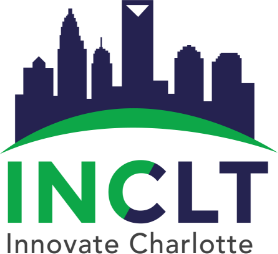Inside a growing movement to help black women entrepreneurs find success in the Queen City
Last month, a group of nearly 70 black female entrepreneurs (and a few men) gathered in the space occupied by Dupp & Swat at Camp North End.
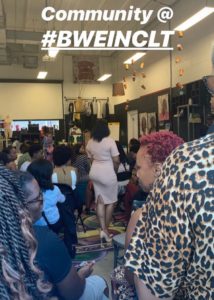
It was referred to as a town hall — an opportunity for black women in Charlotte’s startup community to come together and talk about the issues limiting their growth and what it would take to find success as an entrepreneur of color in the Queen City.
The event, organized by Davita Galloway and Melody Gross, was in part a response to an article that ran in Queen City Nerve about a week before, under the headline “Charlotte’s leading black women entrepreneurs are leaving the city.”
“The article was highlighting three women who chose to leave. What about those of us who are still here and who choose to remain present and fight?” Galloway said. “Our story is just as important, if not more important, because we’re still in the trenches.”
It soon became clear the town hall was more than a one-time reaction. The conversation that night was passionate and intense. It dug into the issues facing black women entrepreneurs in Charlotte — issues related to access, resources, mentorship, affordable space, social capital, trauma — and explored solutions. The nonprofit Women’s Business Center of Charlotte talked about its free educational programs. A few financial advisors in the room offered to host complimentary workshops and classes. And by the end of the night, the hashtag for the evening, #bweinclt, had reached trending status.
“That proves the point that there are women here who are still fighting, and we matter,” Galloway said. “We just need to figure out how we can pool resources and work together to win.”
The diversity problem in Charlotte is well-documented: In 2017, for instance, BBC Research conducted a study on disparity for the City of Charlotte. It found that, on average, annual revenues for black-owned businesses total $60,000, compared to nearly $500,000 a year for white-owned businesses.
So instead of focusing on the problems, Galloway wants more conversations about solutions. As a new ecosystem support organization, Innovate Charlotte wants to do the same. We are actively working with tech and non-tech entrepreneurs, for-profit and non-profit founders, and we are reaching into different communities to ensure our work is as diverse as the city we serve. As part of those efforts, we spoke with five black women living and working in Charlotte: Davita Galloway, Dr. Shante’ Williams, Jameka Whitten, Kelley Palmer and Melody Gross. We asked about their experiences as entrepreneurs, and about how we can foster greater diversity in the Queen City. Here’s what they had to say.
Solution: Broaden our definition of viable, scalable and profitable businesses
Dr. Shante’ Williams is a venture capitalist in the thick of raising $50 million for two funds, one focused on social impact and the other centered on health care. She’s also the managing partner of RW Capital Partners, a venture capital and investment due diligence firm with investments across nine industries, from biotech and pharma to consumer technology. And she’s an advisor, to more than 42 small businesses and 75 entrepreneurs.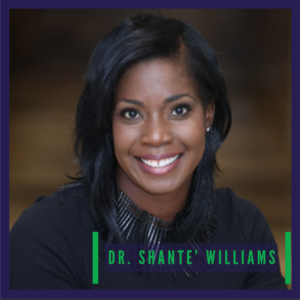
In short, her work is about looking for opportunity, and she knows Charlotte is actively missing out.
“In Charlotte, we have a very narrow definition of what entrepreneurship is,” Williams explained. “We are now at the stage where it would be very hard to recognize our next billion-dollar company because we are so focused on it being a fintech company or some socially connected XYZ that I think we miss complete sectors.”
For example, the first black female millionaire was a woman named Madam C.J. Walker. She started her business in 1905. It was a line of hair products for African-American women called “Madam Walker’s Wonderful Hair Grower.”
“No one here would invest in that. We see a business like hair products as a side thing. But it takes investment in any concept to take it to the next level. If we continue with our narrow definitions, we’re going to miss a lot of potentially good things,” Williams said.
Solution: Start saying ‘yes’
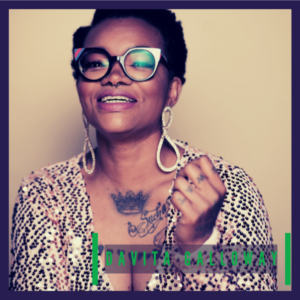 Davita Galloway is an artist, costume designer, writer, publisher and co-owner of the creative studio Dupp & Swat, which played host to the town hall back in June. She’s the co-founder of Spread, a quarterly digital and print magazine celebrating the culture of Charlotte, a Queen City native and a participant in Innovate Charlotte’s Venture Mentoring Service.
Davita Galloway is an artist, costume designer, writer, publisher and co-owner of the creative studio Dupp & Swat, which played host to the town hall back in June. She’s the co-founder of Spread, a quarterly digital and print magazine celebrating the culture of Charlotte, a Queen City native and a participant in Innovate Charlotte’s Venture Mentoring Service.
A few years back, Galloway shared a story about survival at Creative Mornings. It was a story she had shared several times before, but this time was different.
“I was able to tell my story in front of an audience that didn’t look like me. And so many opportunities have come from that,” she recalled. “Because that platform was given to me, because they said ‘yes’ to me, I was able to share and expand.”
That’s why Galloway is an advocate for a seemingly simple solution: saying “yes” to people, regardless of what they look like.
“I’m constantly fighting the idea of what a professional looks like. We have tattoos, and we’re colorful. We look differently these days, but what we look like has nothing to do with what we’re capable of doing,” Galloway said.
Solution: Give everyone access
Jameka Whitten is the CEO and principal publicist at JSW Media Group, a boutique public relations and brand management firm headquartered in Charlotte, with offices in New York, D.C. and Atlanta. She was born in Charlotte, left when her family moved to Richmond, Va., attended Northwestern University and then moved back to the Queen City in 2000 to start her career.
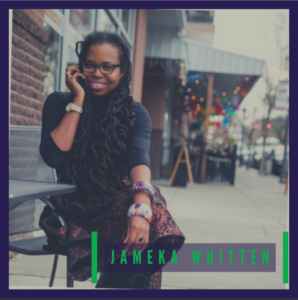 Over the past 19 years, she’s watched the city’s business landscape change in different ways, but what hasn’t changed is access, she said.
Over the past 19 years, she’s watched the city’s business landscape change in different ways, but what hasn’t changed is access, she said.
“Black women in particular, we’re not getting the access we need. The talent is here. The knowledge is here, but if you don’t have access to the appropriate resources and the people, then you’re not going to advance in a way that’s going to be meaningful and effective,” she said.
Access is a complex problem to solve, but one solution Whitten advocates is more mentorship, specifically for young black women in Charlotte.
“Are we going into the high schools and targeting the young black women? Are you getting into coding? Are you getting into tech? Do a math camp. Learn a different language. Get ready to go abroad. There are so many teenagers I talk to who don’t even realize they can go abroad for school,” Whitten said. “That’s resources and education, and we have to build that foundation.”
One woman in Charlotte is already doing that: Jania Massey, founder of Stiletto Boss University.
“She goes into the community and finds little girls who look like us and brings professional women and people to them to show them about entrepreneurship. She’s doing at a micro scale what we should be doing all over the city,” Whitten said.
Another path to greater access? Don’t wait for an invitation to meet people from outside your network. Be proactive; invite yourself, Whitten said.
“People of color are well-versed on the majority. We speak two languages. We live two different lives, and we go in and out of both. There’s nothing stopping someone from finding out what’s important to our community, too,” Whitten said. “It would be great for both sides to be deliberate about diversity and not stop at it.”
Solution: Embrace cooperative economics
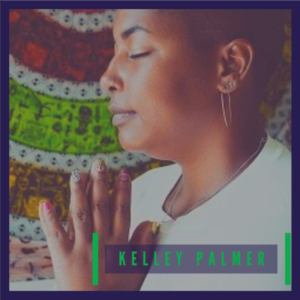 Kelley Palmer is a creator, curator, yogi, wellness advocate and writer and the founder of Peace Filled Mama, the platform through which she offers coaching, yoga and workshops primarily for women and mothers. She is the co-founder of the nonprofit Sanctuary in the City, which provides restorative yoga for those who have suffered race-based traumatic stress injuries. She too is a native Charlottean, and before embarking on her career in mindfulness and wellness, she owned a hair salon in the Queen City for eight years.
Kelley Palmer is a creator, curator, yogi, wellness advocate and writer and the founder of Peace Filled Mama, the platform through which she offers coaching, yoga and workshops primarily for women and mothers. She is the co-founder of the nonprofit Sanctuary in the City, which provides restorative yoga for those who have suffered race-based traumatic stress injuries. She too is a native Charlottean, and before embarking on her career in mindfulness and wellness, she owned a hair salon in the Queen City for eight years.
For her, part of what makes a business sustainable and successful is cultivating community. She points to Davita Galloway as a prime example.
“Davita holds this space for so many other people to sell their things, to have their workshops. That’s the first place I taught yoga because I wanted to teach a class that was $5, and I wanted to do it on a weekend. Davita charged me $20 to teach in her space. No other yoga studio would do that,” Palmer said.
She calls it “cooperative economics”.
“Because of this notion of just trying to survive, there’s this space of not sharing — because we think there’s not enough. Cooperative economics is the notion that I’m going to use whatever resources I have to make sure that you also have access to resources,” Palmer explained. “Everyone is starting to awaken. We just keep talking about it so hopefully more and more people will awaken.”
Solution: Get comfortable being uncomfortable
Melody Gross is the director of marketing and communications for Big Brothers Big Sisters of Central Carolinas. She also runs her own PR firm, The STACII Agency, helping nonprofits with community outreach and working with speakers and authors, and conducts workshops around balancing motherhood and entrepreneurship. A domestic violence survivor, she also does speaking engagements around town about her experience.
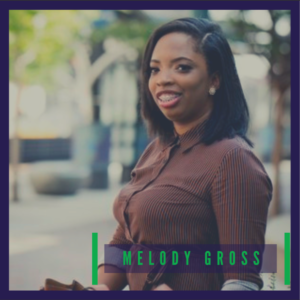 Gross moved to Charlotte from New York in 2011, and since then, she’s worked with a number of organizations on issues the city is facing. But more often than not, those conversations are missing a diversity of perspective.
Gross moved to Charlotte from New York in 2011, and since then, she’s worked with a number of organizations on issues the city is facing. But more often than not, those conversations are missing a diversity of perspective.
“If I feel like someone’s missing in the room, I’m going to say it in a way that, for some people, can be very uncomfortable. But I’m not going to speak a language to make someone else feel comfortable because the fact that they’re comfortable is the reason someone else isn’t in the room,” Gross said. “If that makes you uncomfortable, you need to figure out why because the language I speak is the language of passion, the language of love. It just may not look like what people are used to.”
As a co-founder of the initial town hall at Dupp & Swat, Gross said the plan is to keep the conversation going and create a safe space for black female entrepreneurs to talk, learn and share resources.
“We’ve been getting some great feedback, great support, and we don’t want to lose that momentum,” Gross said. “And we want to make sure we’re listening to the women and what they’re needs are, where we can meet them.”
At Innovate Charlotte, we are committed to promoting greater diversity in Charlotte’s startup community. As part of that commitment, we want to encourage more conversations about solutions when we discuss problems. We want to encourage everyone to contribute, rather than waiting for someone else to solve it. And we want to find a way to bring the conversations around diversity out of the silos and into the mainstream.
![]() More and more companies want to be a part of those efforts. RMCSoft, for one, is excited to continue partnering with INCLT and supporting our efforts to spread the word about what’s happening in the Charlotte startup community now — and where we’re heading.
More and more companies want to be a part of those efforts. RMCSoft, for one, is excited to continue partnering with INCLT and supporting our efforts to spread the word about what’s happening in the Charlotte startup community now — and where we’re heading.
INCLT is currently accepting applications for mentors looking to take part in the Venture Mentoring Service. Companies are encouraged to apply as well but you will be joining the waiting list.
Apply to get a team of mentors
Apply to become a mentor with INCLT
Want to learn more about how to support INCLT? Contact Igor Gorlatov at [email protected].
